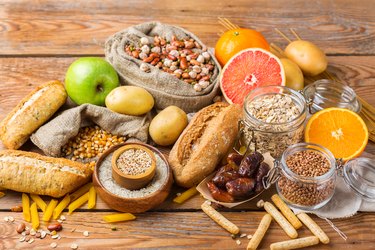
With so many forms of sugar — natural and added — in foods, it can be hard to keep them straight. Two common terms, glucose and dextrose, are actually chemically identical. Although the words can be used interchangeably, it helps to be aware of these slight distinctions.
Glucose and Dextrose Explained
Video of the Day
Glucose is also known as dextrose or d-glucose, according to the National Center for Biotechnology Information. Regardless of the terminology, it's a single unit of sugar known as a monosaccharide. There's no difference between glucose, dextrose and d-glucose — they're simply different terms for the same monosaccharide, and all have the exact same chemical composition.
Video of the Day
What's most important to know is that, because glucose/dextrose is only a single molecule, it breaks down quickly and is considered a simple sugar. According to the U.S. National Library of Medicine, a variety of foods, including fruits, vegetables and milk, contain long chains of these sugars. They're particularly prevalent in starchy carbohydrates like bread, pasta, corn and potatoes.
"Dextrose and glucose are the same thing — a simple sugar that can raise one's blood sugar levels very quickly," says Kylie Ivanir, RDN, a Los Angeles dietitian and founder of Within Nutrition. "Despite being the same thing, the terms are used in different ways."
Read more: Differences Between Simple Sugars & Starches
How They Differ
Glucose. Typically, glucose refers to the molecule once it's in the process of being digested by the body. "The word glucose is used to refer to blood sugar," Ivanir says. Indeed, blood glucose is the more technical term for blood sugar.
Glucose is also the term used when describing the sugar that you burn for energy. As explained in research published in February 2016 in BBA Clinical, glucose is stored in the liver and muscles as glycogen so it can be used by the body for energy later.
Dextrose. "The term dextrose comes from the fact that the form of glucose typically found in nature — if you form a solution of it — is going to polarize light to the right, and 'dexter' means right," Ivanir explains.
The term dextrose is usually used in the context of food. Dextrose is typically sourced from cornstarch and is used as a sweetener in food manufacturing. It's commonly found in baked goods, processed food and corn syrup, according to Ivanir. While it's common to see dextrose as an ingredient on food labels, it's rare to see the term glucose used.
Dextrose is also the term used when sugar is administered orally as a treatment for low blood sugar levels, the Mayo Clinic says. The use of dextrose as a medicine can have some side effects. "If too much is taken, it can cause hyperglycemia (high blood sugar)," Ivanir notes. "This is especially dangerous for people with diabetes, but also harmful for non-diabetics. Hyperglycemia can cause excessive thirst, diarrhea, swelling and, at its worst, even death."
L-glucose. According to a study in Human Cell, published in July 2015, there's another type of glucose called l-glucose, which is a mirror image of d-glucose. However, l-glucose is not a naturally occurring compound in nature and is made in a lab. When you see the terms dextrose or glucose, they're referring to the d-glucose form.
Bottom Line
All of this terminology can be confusing. For decades, doctors have been petitioning to standardize the terminology because so many people think of glucose and dextrose as different compounds, according to a letter published in July 1976 in the BMJ. That hasn't happened.
So, despite the differing uses for these terms in the medical and manufacturing fields, glucose, d-glucose and dextrose are chemically identical.
Read more: Is Dextrose Bad for Me?
- BBA Clinical: “Glycogen Metabolism in Humans”
- Mayo Clinic: "Dextrose (Oral Route)"
- The BMJ: “Letter: Glucose Is Dextrose Is Glucose”
- Human Cell: “Uptake of a Fluorescent L-Glucose Derivative 2-NBDLG Into Three-Dimensionally Accumulating Insulinoma Cells in a Phloretin-Sensitive Manner”
- Kylie Ivanir, RDN, private practice dietitian, Los Angeles
- National Center for Biotechnology Information: “D(+)-Glucose”
- U.S. National Library of Medicine: “Carbohydrates”
Is this an emergency? If you are experiencing serious medical symptoms, please see the National Library of Medicine’s list of signs you need emergency medical attention or call 911.